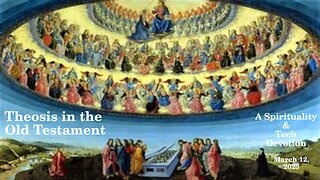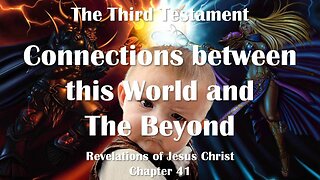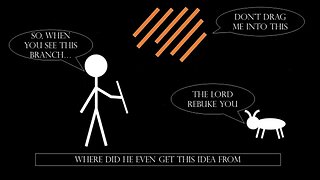Episode 1402: Summa Theologica - Part 1 E. The Creation of the World
Thomas Aquinas delves into the act of creation and related topics. Here is a summary of this chapter:
Nature of Creation:
Aquinas affirms that God is the Creator of the world, and He brought it into existence out of nothing. Creation is the result of God's free and deliberate act of will. God's creative act is not constrained by any pre-existing matter but is a truly ex nihilo (out of nothing) creation.
Here's a more extensive overview of his views on this topic:
Creation ex nihilo:
Aquinas firmly affirms the concept of creation ex nihilo, which means creation out of nothing. According to Aquinas, God brought the entire universe into existence through His free and deliberate act of will, without the need for pre-existing matter. The notion of creation ex nihilo highlights the absolute power and sovereignty of God as the Creator.
God's Free and Deliberate Act:
Aquinas stresses that the act of creation is a free and deliberate act of God's will. God chose to create the world, and there was no compulsion or necessity for Him to do so. The act of creation is an expression of God's infinite goodness and His desire to share His goodness with creatures.
Contingency and Dependence:
Aquinas explores the contingency of creatures in contrast to God's necessity of existence. All created beings are contingent, meaning they depend on God for their existence. Without God's continuous sustaining power, creatures would cease to exist. In contrast, God's existence is necessary, meaning He exists in and of Himself and does not depend on anything else for His being.
Distinction from God:
Aquinas emphasizes the radical distinction between the Creator (God) and the created world. God is pure act and existence itself, while creatures possess a limited and finite existence. There is an infinite qualitative difference between God's essence and the essence of created things.
Limits of Human Understanding:
Aquinas acknowledges that the nature of creation, being a divine mystery, exceeds the limits of human understanding. While he provides philosophical arguments and theological insights, Aquinas maintains that the full understanding of creation remains beyond human comprehension. The act of creation is a divine mystery that invites awe and reverence before the majesty of God.
Unity and Diversity:
Aquinas highlights the unity and diversity present in creation. While the created world exhibits a great diversity of beings, there is an underlying unity in the fact that all things are brought into existence by the same Creator. The unity of creation reflects the harmonious order established by God's wisdom and providence.
Purpose and Teleology:
Aquinas suggests that creation has a purpose and is teleological in nature. Everything in the created world is directed towards an end or goal determined by God's providential plan. Each creature, in fulfilling its particular purpose, contributes to the overall purposefulness of creation.
Limited Analogical Understanding:
Aquinas relies on analogical language and reasoning to describe the nature of creation. He often uses analogies and metaphors to help humans grasp the concept of creation, recognizing that human language and concepts are limited when discussing divine realities.
Aquinas's discussion on the nature of creation emphasizes the profound theological and philosophical implications of God as the Creator. Creation ex nihilo underscores God's absolute power and sovereignty, while the contingency of creatures highlights their dependence on God. Aquinas's understanding of creation as a divine mystery calls for humility and reverence, recognizing the limits of human understanding when contemplating the profound act of God's creation.
Distinction Between Spiritual and Material Realms:
Aquinas explores the distinction between the spiritual and material realms. He identifies angels as spiritual beings created by God with intellect and free will. These angels exist in a purely spiritual realm, distinct from the material world. In contrast, the material realm comprises the physical universe and everything that can be perceived through the senses.
Aquinas's discussion of the distinction between the spiritual and material realms is a significant aspect of his philosophical and theological thought. Here is a more extensive overview of his views on this topic:
Nature of Spiritual Beings:
Aquinas identifies spiritual beings as those that lack a physical body and are immaterial. They exist in a different mode of being compared to material beings. Spiritual beings, according to Aquinas, possess intellect and will. These attributes make them capable of knowing and understanding things beyond the reach of the physical senses and acting with freedom and choice.
Angels as Spiritual Beings:
The primary example of spiritual beings in Aquinas's worldview is angels. He asserts that angels are purely spiritual creatures, created by God with intellect and free will. While humans possess both a spiritual soul and a physical body, angels are entirely spiritual and lack a corporeal form. They are immortal and have individual personalities, each with their own unique characteristics.
Distinction from Material Beings:
Aquinas emphasizes that the spiritual and material realms are fundamentally distinct. Material beings, including humans and the physical world, are composed of both body and soul. They are subject to the limitations of the physical world and are bound by time and space. In contrast, spiritual beings like angels are not constrained by physical limitations and exist outside the confines of the material world.
Superiority of Spiritual Beings:
Aquinas considers spiritual beings, particularly angels, to be superior to material beings, including humans. Angels possess intellectual capacities that surpass human understanding. They have a more direct and immediate knowledge of God, which enables them to fulfill their role as messengers and instruments of God's providence.
Interactions with the Material World:
Aquinas believes that spiritual beings, particularly angels, can interact with the material world. While angels do not have physical bodies, they can influence the natural order and act as intermediaries between God and humanity. They can communicate with humans through direct divine revelations or visions and carry out specific tasks according to God's will.
Different Orders of Spiritual Beings:
Aquinas proposes that within the realm of spiritual beings, there are different orders or hierarchies. He distinguishes between different types of angels, such as Seraphim, Cherubim, and Thrones, each with specific functions in God's plan. This hierarchical order reflects the diverse roles and degrees of excellence among spiritual beings.
Angels as Messengers and Guardians:
According to Aquinas, angels play essential roles in God's providential care for creation. They act as messengers, conveying divine messages and fulfilling specific tasks in God's plan. Some angels are assigned as guardians to individuals, guiding and protecting them according to God's will.
Aquinas's discussion of the distinction between spiritual and material realms highlights the significance of spiritual beings, particularly angels, in the cosmic order. He views angels as superior to humans in certain respects due to their purely spiritual nature and their more immediate knowledge of God. While the spiritual and material realms are distinct, Aquinas emphasizes the interaction and interplay between these realms through the role of angels as messengers and instruments of divine providence.
Existence and Nature of Angels:
Aquinas argues for the existence of angels based on their role as intermediaries between God and humans. He considers angels to be incorporeal, immaterial beings with intellectual capacities superior to humans. Aquinas asserts that angels are distinct from human souls and are a separate order of beings created by God.
Here's a more extensive overview of his views on this topic:
Existence of Angels:
Aquinas firmly believes in the existence of angels as a separate order of spiritual beings. He asserts that angels are real and distinct entities created by God. Aquinas supports the existence of angels based on the authority of sacred scripture and the teachings of the Church. He also offers philosophical arguments, such as the principle that every effect must have a cause, to demonstrate the existence of spiritual beings.
Purely Spiritual Beings:
According to Aquinas, angels are purely spiritual beings, meaning they lack physical bodies. They do not possess a material nature like humans and other creatures in the physical world. Instead, they exist in a state of pure intellect and will, without any material limitations or constraints.
Intellectual Nature:
Aquinas emphasizes the intellectual nature of angels. He describes them as beings of pure intellect, possessing higher intellectual capacities than humans. Angels have an intuitive knowledge of God and understand divine truths in a more direct and immediate way. They do not need the process of learning or reasoning but have innate knowledge of their proper roles and functions.
Immortal and Incorruptible:
Angels, being purely spiritual, are immortal and incorruptible beings. They do not experience physical birth or death like material beings. Once created by God, angels exist eternally, and their nature is immutable and indestructible.
Personal and Individual Beings:
Aquinas affirms that angels are individual beings with distinct personalities and characteristics. Each angel possesses its own unique identity, intellect, and will. They are not mere abstract concepts but are real beings with personal attributes.
Diversity and Hierarchical Order:
Aquinas suggests that within the realm of angels, there is a hierarchy and diversity of orders. He classifies angels into different choirs, such as Seraphim, Cherubim, Thrones, Dominions, Virtues, Powers, Principalities, Archangels, and Angels. Each choir has specific functions and ranks in God's cosmic order.
Roles and Functions:
Aquinas explains that angels have various roles and functions in God's plan. They serve as messengers, carrying divine messages and communicating God's will to humans. Angels also act as guardians and protectors, guiding and aiding individuals according to God's providential care.
No Material Presence:
Aquinas contends that angels, being purely spiritual, do not occupy physical space or have a material presence. They can interact with the material world by God's will but do not exist in a physical location like material bodies.
Aquinas's exploration of the existence and nature of angels provides a comprehensive understanding of these spiritual beings. He firmly affirms their reality as distinct entities created by God, emphasizes their intellectual nature and higher capacities, and describes their roles and functions within the divine plan. Angels, as purely spiritual and personal beings, occupy a unique place in Aquinas's theological and philosophical framework.
God's Providence:
Aquinas discusses God's providential care for the world. He explains that God governs the universe through both natural laws and His divine providence. Natural laws are consistent and regular patterns that govern the behavior of the physical world, while divine providence refers to God's active and purposeful guidance of creation to achieve His divine plan.
Here's a more extensive overview of his views on this topic:
Definition of Providence:
Aquinas defines providence as the divine plan by which God governs and guides all of creation towards its ultimate purpose. God's providence is His wise and loving care for His creatures, ensuring that everything in the universe fulfills its intended role and contributes to the realization of His divine plan.
God's Foreknowledge and Governance:
Aquinas asserts that God's providence is based on His perfect knowledge of all things. God, being omniscient, knows the past, present, and future with absolute certainty. His providence extends not only to the overall order of creation but also to the individual actions and choices of His creatures.
Human Free Will and God's Providence:
Aquinas addresses the apparent tension between God's providence and human free will. He explains that God's providential governance does not negate human freedom. God's knowledge of all things includes His knowledge of the choices humans will make freely. Divine providence encompasses human freedom, allowing individuals to exercise their will while remaining within the framework of God's plan.
Preservation and Governance of Creation:
Aquinas describes two aspects of God's providential care: preservation and governance. God's preservation refers to His continuous sustenance of all things in existence. Without God's sustaining power, creation would cease to exist. God's governance involves His guidance and direction of creatures towards their respective ends or purposes.
Instrumental and Immediate Causes:
Aquinas explains that God's providence operates through both instrumental and immediate causes. Instrumental causes are secondary causes through which God works to achieve His purposes. These causes can be the actions of humans or other creatures. Immediate causes, on the other hand, are direct interventions of God's will that produce specific effects.
Natural Laws and Miracles:
Aquinas acknowledges the regularity and predictability in the natural world, governed by natural laws. These laws are part of God's providential plan and order. However, Aquinas also affirms the occurrence of miracles—extraordinary events that go beyond the usual operations of nature. Miracles are divine interventions that reveal God's presence and power in the world.
Goodness and Purpose in Providence:
Aquinas emphasizes that God's providence is guided by His infinite goodness and wisdom. Everything in creation is directed towards a good purpose and contributes to the overall harmony of God's plan. Even apparent evil and suffering have a place in God's providence, as they can serve a greater good or be allowed due to human free will.
Trust in God's Providence:
Aquinas encourages trust and confidence in God's providence. He suggests that understanding and accepting God's providential care can bring peace and assurance, even in times of adversity. Trusting in God's wisdom and goodness allows individuals to embrace their role in His plan and seek the fulfillment of His will.
Aquinas's discussion on God's providence highlights the divine care and guidance that governs all of creation. His exploration of the relationship between providence and human free will demonstrates God's overarching plan while respecting human freedom. Aquinas's understanding of God's providence as an expression of divine goodness and wisdom invites individuals to place their trust in God's loving plan for the world.
Angels' Function Within the Cosmic Order:
Aquinas describes the role of angels within the cosmic order. He suggests that angels act as messengers and instruments of God's providential care. They serve as intermediaries between God and humanity, carrying out divine commands and fulfilling specific purposes in God's plan.
Here's a more extensive overview of his views on this topic:
Intermediaries Between God and Creation:
Aquinas emphasizes that angels serve as intermediaries between God and the created world. They act as messengers and instruments of God's providential care. God, being pure spirit, communicates with the material world through spiritual beings like angels. Angels convey divine messages, carry out God's commands, and participate in fulfilling God's plan for creation.
Guardians and Guides:
Aquinas suggests that angels act as guardians and guides for individuals and communities. He explains that each human being has a guardian angel assigned to them by God. These guardian angels protect and guide individuals throughout their lives, offering spiritual assistance and inspiration. Additionally, angels may have broader roles as guardians and protectors of nations or groups.
Spiritual Assistance:
Aquinas highlights that angels provide spiritual assistance to humans. They inspire and guide individuals towards the good and virtuous actions. Angels can prompt individuals to do God's will and encourage them in their spiritual journey. They also offer consolation and strength during times of difficulty or temptation.
Cosmic Order and Harmony:
According to Aquinas, angels play a role in maintaining cosmic order and harmony. As spiritual beings with higher intellectual capacities, angels possess a unique understanding of God's plan for creation. They contribute to the overall order and purposefulness of the universe, ensuring that all things work together in accordance with God's providential design.
Worship and Praise:
Aquinas emphasizes that angels constantly worship and praise God. Their primary function is to glorify God and acknowledge His greatness. Angels engage in perpetual adoration, singing hymns of praise, and offering worship to God. Through their worship, they set an example for humans to recognize and honor the divine majesty.
Participation in God's Plan:
Aquinas views angels as active participants in God's plan for salvation. He suggests that angels have specific roles in significant events, such as the annunciation to Mary or the protection of individuals like Daniel in the Old Testament. Angels cooperate with God in carrying out His divine plan for humanity's redemption.
Spiritual Intelligences:
Aquinas describes angels as spiritual intelligences, meaning they possess higher intellectual capacities than humans. Angels have an innate knowledge of God and divine truths, which enables them to fulfill their roles as messengers and guides. Their intellectual capabilities allow them to understand and communicate divine messages to humans.
Unity and Communion:
Aquinas views the angelic realm as a unified and harmonious community. He suggests that angels are connected through their shared purpose of serving God and fulfilling His will. There is a sense of cooperation and communion among angels, reflecting the unity and order in the spiritual realm.
Aquinas's discussion on the function of angels within the cosmic order highlights their role as intermediaries, guardians, and spiritual guides. Angels play an essential part in maintaining cosmic harmony and fulfilling God's plan for creation. Their worship and praise demonstrate their devotion to God, and their higher intellectual capacities enable them to fulfill their role as messengers of divine revelation. Aquinas's understanding of angels invites contemplation of the spiritual realm and the cooperation between the material and spiritual aspects of creation.
Hierarchical Order of Creation:
Aquinas emphasizes the hierarchical order of creation. God's creation is marked by a gradation of beings, with angels occupying a higher position than humans within the spiritual realm. Among humans, there is a hierarchy of rationality, with human souls possessing intellect and will, which distinguishes them from lower animals.
Here's a more extensive overview of his views on this topic:
God as the Supreme Being:
Aquinas begins his discussion by affirming that God is the Supreme Being and the source of all existence. God is infinite, perfect, and the cause of everything that exists. As the First Cause and the Uncaused Cause, God stands at the apex of the hierarchical order of creation.
Gradation of Being:
Aquinas proposes that all created beings form a hierarchical order based on their level of perfection and participation in God's attributes. Within this gradation of being, each creature reflects a degree of God's goodness, truth, and beauty. Higher beings in the hierarchy possess more profound perfections and are closer to God's nature.
Angels as Higher Beings:
In the hierarchy of creation, angels occupy a higher position than humans. Aquinas considers angels to be purely spiritual beings with intellect and free will. Their intellectual capacities surpass those of humans, and they have a more direct and immediate knowledge of God. Angels are not subject to the limitations of the physical world, making them superior beings within the spiritual realm.
Humans as Rational Beings:
Aquinas places humans in a unique position within the hierarchy of creation. Humans have both a spiritual soul and a physical body, allowing them to participate in both the spiritual and material realms. Their rational nature, endowed with intellect and free will, enables them to know and love God, making them distinct from lower animals.
Animals and Plants:
Aquinas includes animals and plants in the hierarchical order of creation, recognizing their contribution to the diversity and harmony of the natural world. Animals possess sensitive souls, allowing them to experience sensations and emotions, while plants have vegetative souls that enable growth and reproduction. These lower forms of life contribute to the overall beauty and functionality of the natural order.
Inanimate and Material World:
At the lowest level of the hierarchical order, Aquinas includes the inanimate and material world, such as minerals and elements. These entities lack life, sensation, and rationality but still participate in God's goodness through their existence and order. Aquinas emphasizes that even the lowest forms of creation have their place and purpose within God's plan.
Purposeful Design:
Aquinas views the hierarchical order of creation as a purposeful and ordered arrangement. Every creature, based on its position in the hierarchy, fulfills a specific role in God's plan and contributes to the overall harmony of creation. God's wisdom and goodness are manifested in the design and unity of the hierarchical order.
Communion and Cooperation:
Aquinas points out that the hierarchical order of creation involves communion and cooperation among creatures. Each being has its role to play, and there is a sense of interdependence within the cosmic order. The higher beings, such as angels, serve as guides and messengers, while lower beings, including humans, contribute to the material world's development and well-being.
Aquinas's discussion on the hierarchical order of creation highlights the diversity and purposefulness of God's plan. From the Supreme Being to the lowest forms of creation, all creatures participate in God's goodness and reflect different degrees of His perfections. The hierarchical order underscores the unity and interconnectedness of the cosmic order, inviting contemplation of God's wisdom and providential care in the arrangement of creation.
Unity of the Created World:
Aquinas concludes that the created world is a unified whole, with all beings participating in God's divine plan. From the lowest forms of existence to the highest angels, everything contributes to the overall order and purpose of creation. God's providence ensures that the created world functions harmoniously as an expression of His wisdom and goodness.
Here's a more extensive overview of his views on this topic:
Unity in God's Plan:
Aquinas begins his exploration by emphasizing that the unity of the created world stems from God's divine plan. God is the ultimate source of all existence and the creator of the entire universe. As the First Cause and the Unmoved Mover, God governs creation with wisdom and purpose, ensuring that everything works together harmoniously towards a common end.
Divine Order and Purpose:
Aquinas posits that God's plan for creation includes a divine order and purpose. Everything in the universe has a specific role and function, contributing to the overall harmony of creation. Each creature, from the smallest to the greatest, has its place in the cosmic order, and nothing exists without a purpose.
Participation in God's Goodness:
According to Aquinas, the unity of the created world lies in the fact that all creatures participate in God's goodness. As the Supreme Good, God infuses His creation with goodness, and every being, in its own way, reflects and participates in this divine goodness. All things find their fulfillment and purpose in God, the source of all goodness.
Cosmic Hierarchy:
Aquinas acknowledges the hierarchical nature of creation. He describes a gradation of beings, with higher and lower orders, each with its unique attributes and functions. At the summit of this hierarchy are purely spiritual beings, such as angels, who possess higher intellectual capacities. Humans, with their rational souls, occupy a significant position within the hierarchy, as they have the ability to know and love God consciously.
Harmony of the Universe:
Aquinas contends that the unity of the created world is evident in the harmony and order of the universe. Everything operates according to specific laws and regularities, revealing the wisdom and intelligence of the Creator. Natural processes, physical laws, and moral principles all contribute to the functioning and well-being of creation.
The Microcosm-Macrocosm Connection:
Aquinas sees a connection between the microcosm (individual creatures) and the macrocosm (the entire universe). He argues that the order and purpose found in individual beings are reflective of the greater order and purpose of the entire cosmos. This connection highlights the unity and interconnectedness of all things in the grand tapestry of creation.
Teleological Understanding:
Aquinas employs teleology (the study of purpose or final causes) to explain the unity of the created world. He suggests that everything in creation has an inherent purpose or end towards which it tends. All beings seek to fulfill their intended purposes, and this convergence of ends contributes to the unity and coherence of creation.
Divine Providence:
Ultimately, Aquinas attributes the unity of the created world to God's providential care. God's divine providence ensures that everything works together for the good and according to His plan. Divine providence guides the course of history, the actions of beings, and the fulfillment of God's purposes for creation.
Aquinas's discussion on the unity of the created world underscores the coherence, purpose, and goodness inherent in God's plan. From the hierarchical order of beings to the harmony of the universe, everything finds its place and meaning within the greater design of creation. The unity of the created world invites contemplation of God's wisdom and goodness as the guiding force behind all existence.
-
 37:50
37:50
CatholicReboot
1 year agoEpisode 1292 Summa Theologica, Part 1 God and Creation B. B. The Nature and Attributes of God
110 -
 45:43
45:43
CatholicReboot
7 months ago $0.02 earnedEpisode 1644: Summa Theologica - Part 3 - The Person and Work of Christ
96 -
 35:10
35:10
Song & Sword
9 months agoI AM REVEALED - ALL CHURCH STUDY - Creator (Elohim) - Genesis 1:1-31 Episode 1
291 -
 18:26
18:26
Spirituality and Tech
1 year agoTheosis in the Old Testament
56 -
 2:10:05
2:10:05
HandinHandwithGodTv
1 year ago20 Questions with Pastor Mike (Episode 97)
77 -
 1:52:54
1:52:54
HandinHandwithGodTv
1 year ago20 Questions with Pastor Mike (Episode 93)
121 -
 1:56:25
1:56:25
HandinHandwithGodTv
11 months ago20 Questions with Pastor Mike (Episode 104)
94 -
 30:09
30:09
The Third Testament
1 year agoConnection between this World and the Beyond... Jesus Christ elucidates ❤️ The Third Testament Chapter 41
86 -
 10:26
10:26
I'm a Professional Foita!
1 year agoOut of Context - The Bible - Genesis (Part 2)
68 -
 4:16
4:16
Biblical Insights 360
2 months agoInsights into Revelation-Chapter 1
20